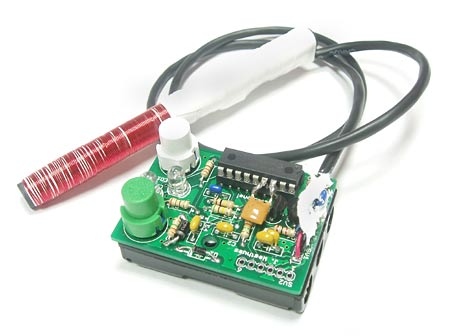Oftewel de Verichip, een RFID.

Die nu al gebruikt wordt: http://www.baja.nl/vipform.aspx
En de bezwaren tegen dit ding: http://www.eqgen.nl/html/bigbrother_verichip.html
En http://www.christian-forum.net/index.php?showtopic=3746

It just might become a reality, when you'll need a computer chip implant to login to your Microsoft Windows PC.
You are at your desk and for some reason you forgot your Windows PC login password. This is a common thing, but there might be a solution in the future to never use passwords again.
With a wave of his hand, Amal Graafstra, a 29-year-old entrepreneur based in Vancouver, Canada, opens his front door. With another, he logs onto his computer.
Tiny radio frequency identification (RFID) computer chips inserted into Graafstra's hands make it all possible.
En die zelfs al cloneable blijkt:
http://cq.cx/vchdiy.pl#dl

En de eerste virussen doen hun opmars al: http://arstechnica.com/news.ars/post/20060315-6386.html
Is Your Cat Infected with a Computer Virus?
It can sometimes be forgotten that computer viruses are not a Windows-only problem, but the recent announcement that RFID chips may be vulnerable to viral attack underscores the threat that malicious code can pose to all types of systems. A group of researchers at Vrije Universiteit in Amsterdam have just presented a paper (PDF) at the Pervasive Computing and Communications Conference in Pisa, Italy that demonstrates just how such a virus might work....
Consider a malicious traveler who attaches a tiny RFID tag, pre-initialized with a virus, to a random person's suitcase before he checks it in. When the baggage-handling system's RFID reader scans the suitcase at a Y-junction in the conveyor-belt system to determine where to route it, the tag responds with the RFID virus, which could infect the airport's baggage database. Then, all RFID tags produced as new passengers check in later in the day may also be infected. If any of these infected bags transit a hub, they will be rescanned there, thus infecting a different airport. Within a day, hundreds of airport databases all over the world could be infected. Merely infecting other tags is the most benign case. An RFID virus could also carry a payload that did other damage to the database, for example, helping drug smugglers or terrorists hide their baggage from airline and government officials, or intentionally sending baggage destined for Alaska to Argentina to create chaos (e.g., as revenge for a recently fired airline employee)."





Figure 2. The world's first virally-infected RFID tag
In de PDF is sprake van een quine: een programma dat zichzelf print.
http://www.cs.chalmers.se/~bringert/quines/
Dit is een voorbeeld van een Java quine:
class q{public static void main(String[]a){String s="class q{public static void main(String[]a){String s=;char c=34;System.out.print(new StringBuffer(s).insert(52,c+s+c));}}";char c=34;System.out.print(new StringBuffer(s).insert(52,c+s+c));}}
Waar men zich al mee bezig houdt!
No comments:
Post a Comment